Big Rip: how a cosmic face-off could 'end the universe'
If dark energy triumphs over gravity, the universe might vanish from view, according to a new theory
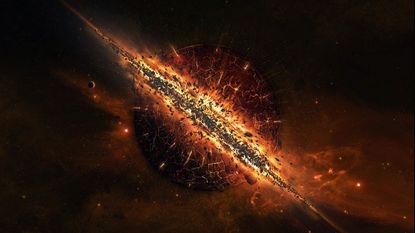
The universe – and all its planets and galaxies – could expand so much that it eventually tears apart and vanishes in a "Big Rip", according to a new theoretical model. The dramatic cosmic finale has been predicted by experts at Vanderbilt University in Tennessee…
What is a Big Rip?
Scientists at Vanderbilt say the universe could eventually expand to such a degree that everything from galaxies to planets to atoms will be torn apart and disappear. "The idea of the Big Rip is that eventually even the constituents of matter would start separating from each other," mathematician Dr Marcelo Disconzi tells The Guardian. "You'd be seeing all the atoms being ripped apart… it's fair to say that it's a dramatic scenario."
Subscribe to The Week
Escape your echo chamber. Get the facts behind the news, plus analysis from multiple perspectives.

Sign up for The Week's Free Newsletters
From our morning news briefing to a weekly Good News Newsletter, get the best of The Week delivered directly to your inbox.
From our morning news briefing to a weekly Good News Newsletter, get the best of The Week delivered directly to your inbox.
When will this happen?
There's no need to down tools at work just yet – the predicted doomsday is not predicted to happen for another 22 billion years.
Is there any way it can be avoided?
Disconzi believes that the ultimate destiny of the universe will depend on a gladiatorial battle between two opposing cosmic forces. "You have this competition between dark energy, that tries to expand the universe, and gravity, that tends to make it collapse again," he said. "The question is: who wins?" If dark energy, believed to make up about 70 per cent of the universe, triumphs over gravity there could be a Big Rip. "Under the rip scenario, dark energy gets stronger and you get this wild expansion that essentially rips space-time apart," says Professor Carlos Frenk, a cosmologist at the University of Durham. "The universe would vanish in front of your eyes. Basically, you don't want to be around for it."
How much consensus is there?
Scientists are now reasonably convinced that the universe began with the Big Bang, around 13.8 billion years ago, says The Guardian. This started at a pinpoint of incredibly high density and expanded to today's universe. However, the way in which the universe might end remains a hot potato for experts. "The only thing we definitely know is that the universe is expanding and that the rate is accelerating," said Disconzi. "That's about the only thing we know for sure."
Create an account with the same email registered to your subscription to unlock access.
Sign up for Today's Best Articles in your inbox
A free daily email with the biggest news stories of the day – and the best features from TheWeek.com
-
 Is the Gaza war tearing U.S. campuses apart?
Is the Gaza war tearing U.S. campuses apart?Today's Big Question Protests at Columbia University, other institutions, pit free speech against student safety
By Joel Mathis, The Week US Published
-
 DOJ settles with Nassar victims for $138M
DOJ settles with Nassar victims for $138MSpeed Read The settlement includes 139 sexual abuse victims of the former USA Gymnastics doctor
By Justin Klawans, The Week US Published
-
 14 recent scientific breakthroughs
14 recent scientific breakthroughsIn Depth From photos of the infant universe to an energy advancement that could save the planet
By Devika Rao, The Week US Published
-
 14 recent scientific breakthroughs
14 recent scientific breakthroughsIn Depth From photos of the infant universe to an energy advancement that could save the planet
By Devika Rao, The Week US Published
-
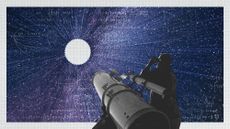 The hunt for Planet Nine
The hunt for Planet NineUnder The Radar Researchers seeking the elusive Earth-like planet beyond Neptune are narrowing down their search
By Chas Newkey-Burden, The Week UK Published
-
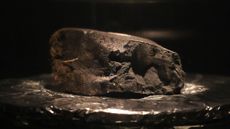 Winchcombe meteorite: space rock may reveal how water came to Earth
Winchcombe meteorite: space rock may reveal how water came to EarthThe Explainer New analysis of its violent journey confirms scientific theories on the origin of our planet's H2O
By Sorcha Bradley, The Week UK Published
-
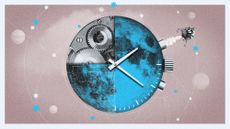 Why the Moon is getting a new time zone
Why the Moon is getting a new time zoneThe Explainer The creation of 'coordinated lunar time' is part of Nasa's mission to establish a long-term presence on Earth's only natural satellite
By Richard Windsor, The Week UK Published
-
 We're in the golden age of space exploration
We're in the golden age of space explorationIn depth To infinity and beyond!
By Devika Rao, The Week US Published
-
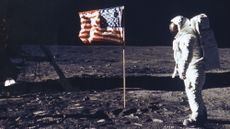 All the major moon landings so far
All the major moon landings so farThe Explainer One giant leap for mankind
By Devika Rao, The Week US Published
-
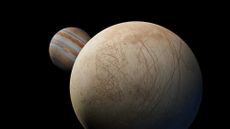 Jupiter's Europa has less oxygen than hoped
Jupiter's Europa has less oxygen than hopedspeed read Scientists say this makes it less likely that Jupiter's moon harbors life
By Peter Weber, The Week US Published
-
 'Magnolias in space': why scientists have created the world's first wooden satellite
'Magnolias in space': why scientists have created the world's first wooden satelliteUnder The Radar New Japanese probe could help tackle 'graveyard of space junk' encircling Earth
By Chas Newkey-Burden, The Week UK Published